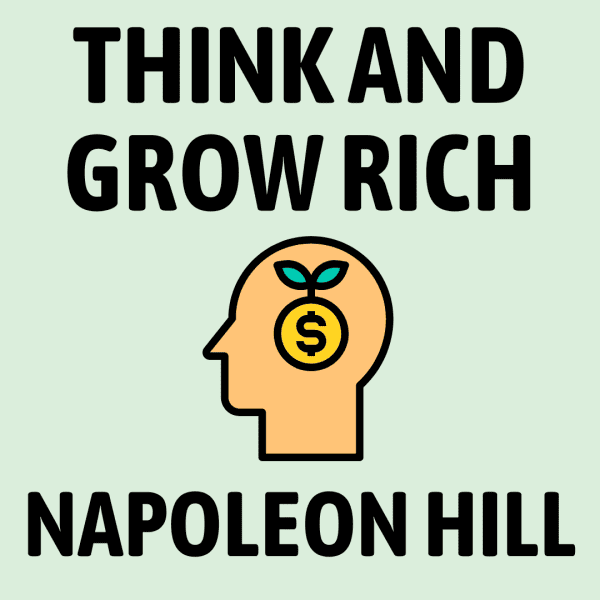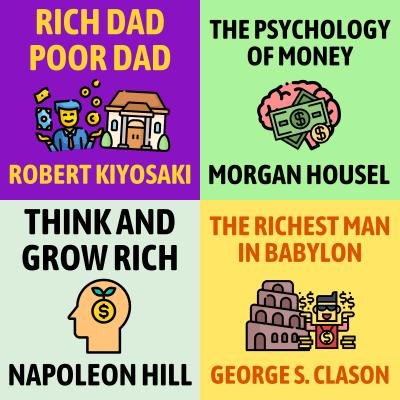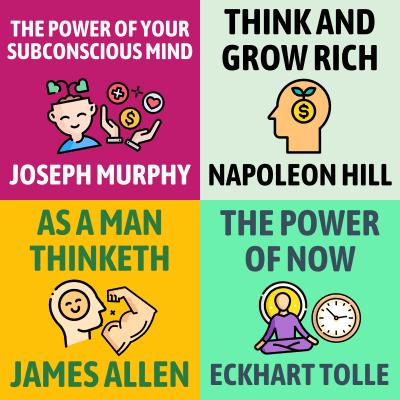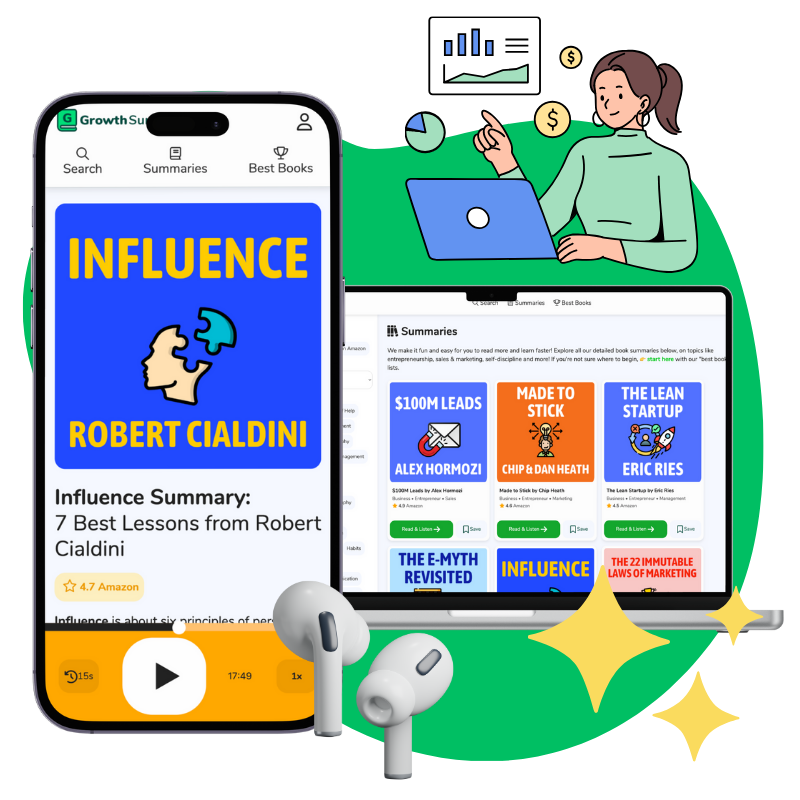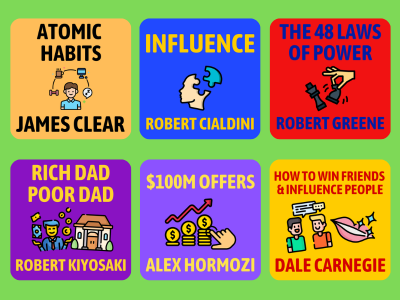Over 80 years ago, Napoleon Hill was a journalist working on a story about successful people.
One day he interviewed Andrew Carnegie, who was a steel industrialist and one of the wealthiest people in the United States at the time. Carnegie was so impressed by Napoleon Hill that he offered him a challenge that would last over 20 years.
Carnegie told Napoleon Hill to interview over 500 millionaires to find a formula for success that would be useful to a regular person. Hill ended up interviewing many very famous, rich and successful people including:
- Thomas Edison,
- Henry Ford,
- Alexander Graham Bell,
- Theodore Roosevelt,
- & more
This book is the result of all that research.
Now, some people may laugh and say, who is dumb enough to believe they can sit around “thinking and growing rich” like this book promises? But the truth is… the ONLY way anybody has gotten rich started with a thought in their head!
For example, Apple Computers and the iPhone began as humble thoughts in Steve Job’s head, long before they were translated into physical reality. And those thoughts in the head of a 20 year old tripped-out hippie built what is right now one of the most valuable companies in the world.
Steve Jobs said it best himself: “Everything around you that you call ‘life’ was made up by people who were no smarter than you. And you can change it, you can influence it, you can build your own things that other people can use.”
An important note: Today some people point out there is no documented proof that Napoleon Hill truly met Andrew Carnegie and received those directions. Some even argue the story could have been fabricated to sell books! Personally, I can’t verify whether it is true or not, but it’s an important reminder that we need to keep thinking critically as we jump into the rest of these ideas!
🔥 1. Cultivate a Burning Desire: The beginning of riches is an overwhelming desire bordering on obsession
The starting point of all achievement is DESIRE. Keep this constantly in mind. Weak desire brings weak results, just as a small fire makes a small amount of heat.
Henry Ford, who built a great fortune selling cars in America, was driven by a burning desire. One day Ford wanted to create a more powerful 8 cylinder engine cast into one block. All the experts said this couldn’t be done. After the design of the new engine had been drawn on paper, his own engineers assured Ford that couldn’t be done.
But Ford said, “produce it anyway.”
Six months later, there was no progress. Ford told his engineers to keep working anyway, until the problem was solved. Another six months passed with little results. Then all of a sudden, like a stroke of magic, the secret to producing the engine was discovered.
Henry Ford is a success because he understands and applies the principles of success. One of these is desire: knowing what one wants.
A long time ago, a great warrior landed on enemy shores with his army. The first thing he did was tell his soldiers to burn their boats so they had no way to retreat. This meant his soldiers knew they had to win the upcoming battles, or they died. And they gave 100% of their efforts to winning because there was no option to retreat anymore. In the same way, those who succeed in any difficult undertaking cut all sources of retreat. And this fuels their burning desire for success.
The starting point of all riches is a burning desire for them. This is the emotional fuel that drives people to success. Henry Ford’s burning desire for success kept his team working on a new engine design for a year when everyone said it was impossible. In the end, Ford’s strong desire won.
🎯 2. Set a Definite Purpose: Clear goals that are written down are essential for success, not vague wishes
Edwin C. Barnes always dreamed of partnering with Thomas Edison, the famous inventor. The problem was that Barnes was a nobody. He had no money, no connections and no real skills.
So what did he do? He hopped on a freight train (because it was the cheapest way) then travelled to Edison’s front door and asked for a job. Edison says that although Barnes looked like a regular homeless person on his doorstep, he could see some spark of determination in his eyes. So he gave Barnes a basic job.
Then Barnes had to endure many years of menial work. Some would have seen this as a failure. After all, Barnes had come to work WITH Edison, not FOR him! But Barnes knew he was in the right place to make his dreams a reality. He kept working while keeping his eyes open for opportunity.
That is one of the tricks of opportunity. It has a sly habit of slipping in by the back door, and often comes disguised in the form of misfortune or temporary defeat. Perhaps this is why so many fail to recognize opportunity.
And eventually opportunity did come to Barnes in the form of a strange new invention called the Edison Dictating Machine.
Edison’s regular salespeople said they couldn’t sell this new invention, so Barnes jumped on the chance. And he sold this machine so successfully that Edison made him his partner to market and distribute the machine all over the country.
Barnes succeeded because he chose a definite goal, and placed all his energy, all his willpower and all his effort into achieving that goal.
98% of people you meet have vague wishes for money, security, happiness, fame or power. They want a life of ease, perhaps social recognition or expression through art, music or writing. Yet not one of those people will have definite plans for achieving any of that!
As Napoleon Hill says, “riches do not respond to wishes.” They only respond to clear and definite goals. To attain riches, you must have a clear direction where you are going. And you must know exactly when you start getting off track from your definite plans so you can take immediate steps to correct your behavior.
Edwin C. Barnes went from being a nobody to Thomas Edison’s business partner because he had a very clear goal. 98% of people have vague wishes for money or other things, but no definite goals. “Riches do not respond to wishes” but only defined articulated plans.
💪 3. Exercise Persistence: We will all face inevitable failure and adversity, the question is whether we choose to continue
One of the most common causes of failure is the habit of quitting when one is overtaken by temporary defeat.
R.U. Darby was one of the most successful insurance salesmen in the country. When asked what motivated him, he told the story of his uncle.
Uncle Darby had gone west during the gold rush years to dig and grow rich. He dug in fields until he discovered gold ore, then he quietly bought the field and mining machinery to dig up the gold. Unfortunately, when he began digging again the gold vein he’d discovered suddenly ended. He dug a around further, but couldn’t see any more gold. So he quit and sold the machinery to a junk man and went home.
The junk man was smarter than he looked. He hired an engineer to look at the spot where Uncle Darby had been digging. The engineer said the uncle was unaware of “fault lines” and that the gold vein continued just 3 feet from where he had stopped digging! So the junk man continued digging in the same spot and quickly became a millionaire. Remembering this story in his profession as an insurance salesman, Darby said to himself:
‘I stopped three feet from gold, but I will never stop because men say “no” when I ask them to buy insurance.’
Most people quit at the first sign of adversity or bad luck. A few keep going in spite of that. Those few become the Jeff Bezos, Bill Gates and Elon Musks of the world. When you face temporary defeat, take it as a sign that you need to revise your plans to make them more robust.
Persistence is a hallmark in the life story of every successful person. This means continuing in spite of inevitable adversity, bad luck or failure. Learn from the mistake of Uncle Darby, who gave up digging just 3 feet from gold.
😎 4. Conquer Fear of Criticism: Being afraid of what others will say is often the biggest obstacle to chasing our dreams
Napoleon Hill says there are six major fears that stop people from attaining riches. They are:
- The fear of poverty
- The fear of criticism
- The fear of ill health
- The fear of loss of love of someone
- The fear of old age
- The fear of death
Let’s focus on the fear of criticism, because this is one of the most powerful fears that affects most of us. Criticism can often make people lose hope and feel depressed. At the very least, most people feel very uncomfortable with receiving criticism.
The worst part is, our close relatives are often the worst offenders. Parents often demoralize kids through criticizing their dreams rather than offering constructive suggestion. Even as adults, we can feel handicapped by the uninformed opinions or ridicule of others, which is often jealousy thinly disguised as humour.
Guglielmo Marconi, now known as the inventor of the radio, was hauled into a psychiatric hospital by his friends. Why? Because when he said he had discovered how to send messages through the air without wires, his “friends” thought he needed to have his head examined!
Every successful person has received a great share of criticism. Arnold Schwarzenegger was criticized for his acting ability, before becoming the highest paid action movie star. Michael Jordan was criticized for being too old to play basketball, before coming back and winning the MVP award multiple times. Even Napoleon Hill, when first commissioned to write books about success, his first thought was “what will people think?”
The fear of criticism, ridicule and “what will people think” sabotages many people’s dreams before they even begin. It is essential to move past this fear through recognizing that every great person faced criticism at one point, even from their own family and friends!
✏️ 5. The Daily Six Steps: Writing down our desires then reading them aloud daily is how we transform desire into material gain
Wishing will not bring riches. But desiring riches with a state of mind that becomes an obsession, then planning definite ways and means to acquire riches, and backing those plans with persistence which does not recognize failure, will bring riches.
In the book, Napoleon Hill offers a clear six step action plan to allow us to turn our desires into riches. Here it is:
- Decide exactly how much money you want.
- Decide exactly what you will give in return for this money.
- Decide an exact date you will get the money by.
- Create a definite plan, then begin working the plan right away, whether you are “ready” or not.
- Write out those first four steps on a sheet of paper and….
6. Read your written statement aloud, twice daily, once just before retiring at night, and once after rising in the morning. AS YOU READ, SEE AND FEEL AND BELIEVE YOURSELF ALREADY IN POSSESSION OF THE MONEY.
As you can see, this six step plan puts together the last lessons from this book together into something practical. This is how you can get clear on your desires, turn them into definite goals that you can pursue with persistence. This is a slip of paper which you can look at and read daily that will keep you on track towards riches. And soon we’ll learn more about why this process works. (Because it speaks directly towards your subconscious mind.)
Write down on a sheet of paper: 1. How much money you want 2. What you’ll do for it 3. When you’ll get it by 4. Create a definite plan and start working it 5. Write this all down on paper and 6. Read the statement aloud twice daily while feeling yourself already in possession of the money.
🧠 6. Practice Autosuggestion: We communicate with our subconscious mind by saying affirmations with emotion
Napoleon Hill says we can reach our subconscious mind through our five senses. This means we can have total control over what material reaches our subconscious mind by limiting what our five senses are exposed to. And a powerful technique for talking directly to our subconscious minds is called autosuggestion.
Autosuggestion is done by going to a quiet place and reading aloud your definite statement about money and plan for getting it. But to really make this work, your words must be infused with faith and emotion.
- Faith is simply the belief or expectation that your desire will manifest in physical form.
- Emotion or feeling are absolutely essential, mixing emotion with your words is what gives them power.
ALL THOUGHTS WHICH HAVE BEEN EMOTIONALIZED (given feeling) AND MIXED WITH FAITH begin immediately to translate themselves into their physical equivalent or counterpart.
Autosuggestion is reading aloud your six step statement about money. But for your words to reach your subconscious mind, you must infuse them with strong emotions and faith.
📚 7. Acquire Specialized Knowledge: Learn skills that are useful for solving other people’s problems, then put them to use
Henry Ford never made it to high school, let alone university. Yet he built one of the greatest and most innovative companies of his time. One story illustrates why.
During World War 1, Henry Ford was called an “ignorant pacifist” by a Chicago newspaper. He sued the newspaper, and in court the newspaper’s lawyers asked him many questions to prove he was ignorant. These were general questions like “How many soldiers did the British send over to stop the American Rebellion in 1776?” and so on. Well, at some point Ford got tired of these pointless questions so he told the lawyer:
‘If I should really want to answer the foolish question you have just asked, or any of the other questions you have been asking me, let me remind you that I have a row of electric push-buttons on my desk, and by pushing the right button, I can summon to my aid people who can answer any question I desire to ask concerning the business to which I am devoting most of my efforts. Now, will you kindly tell me why I should clutter up my mind with general knowledge, for the purpose of being able to answer questions, when I have people around me who can supply any knowledge I require?’
The lawyers were stupefied. And with that statement, Henry Ford demonstrated 2 important things:
- An educated person is someone who knows how to get what they want in life without infringing the rights of others. (This is Napoleon Hill’s definition) And this is not necessarily someone who’s had a lot of schooling or degrees.
- People are not paid for their knowledge, but what they DO with knowledge. In fact, people can even get rich by applying other people’s knowledge (like Henry Ford did). It is the organized application of knowledge that transforms it into something powerful. And it is for this reason a university degree does not guarantee a high paying career, if the knowledge gained cannot be practically applied.
You won’t get paid just for having knowledge. But the right knowledge, organized and applied to solve real world problems, is what makes people rich.
🤝 8. Organize a Master Mind: Multiply your specialized knowledge with a roundtable group of competent people and advisors
Andrew Carnegie, the incredibly wealthy steel industrialist who commissioned Napoleon Hill to write this book, worked in a similar way to Henry Ford.
Carnegie didn’t know anything about the technical manufacturing of steel, and he didn’t want to know. Why? Because he had a large pool of experts working for him that he could call upon at will and they would answer any question he had. He called this his “Master Mind Group.”
Anyone seeking riches should form their own Master Mind Group. This is a group of people who have specialized knowledge that you need but don’t have. And you should consider what benefits you can offer in return for people joining your Master Mind Group. Most intelligent people will not work for free, but compensation doesn’t always have to be money.
Most very wealthy people attained riches not just through their own knowledge, but by organizing the knowledge and skills of many other people. You should also make use of the experience, education and talents of other people to make your own dreams into reality.
Wealthy steel industrialist Andrew Carnegie didn’t know how to make steel, but he surrounded himself with many people who had knowledge he lacked. You should also create a Master Mind Group of people who will multiply your access to knowledge and experience.
💙 9. Transmute Sex Energy: Redirecting our creative energy towards outer achievements is possible
Sexual desire is the most powerful human drive. It can motivate people to levels of willpower and persistence that no other desire can. People knowingly risk their reputations, livelihoods and families for sexual contact. And look at what happens to animals like bulls when they have become castrated and no longer have that sexual drive. They become as docile as cows.
The most successful people have learned how to harness sex, because it is the strongest source of action. Rather than engage in unregulated sex habits (which are as destructive as unregulated drinking or eating habits), successful people learn to transfer this energy to higher outlets. This is what Napoleon Hill calls Sexual Transmutation.
Most of the artists and geniuses of the past have done sexual transmutation, whether they are aware of it or not. Rather than suppressing sexual desire, they expressed the outbursting energy through another channel, like creating music or starting a business.
Napoleon Hill says it is for this reason most men do not reach real success until the 40s or 50s. Before that age, they waste their sexual energy frivolously. It is also true that love serves as a counterbalance to sexual desire, giving it more control, calmness and purpose.
Sexual desire is the most powerful human drive, but most people waste this energy frivolously through intemperate sex habits. The greatest artists, geniuses and successful people harness their sex energy, expressing it through higher outlets that nourish mind and soul.
💡 10. Unleash Creative Imagination: Prepare yourself to receive more flashes of inspiration, by increasing emotions of faith and hope
There is a source of intelligence greater than any other. This is what Napoleon Hill calls Infinite Intelligence. This is the intelligence that converts acorns into oak trees and one tiny cell into your current living, breathing body. It’s an intelligence far beyond the greatest human philosophers.
It’s a fact that many of the greatest minds say their best ideas came to them suddenly, through “hunches” or a flash of inspiration. And Infinite Intelligence is the source of those flashes, not painstakingly slow rational thinking.
There was a great speaker who does not achieve greatness until he closes his eyes during the climax of his speeches. He says when he does this, he begins ‘speaking through ideas which come from within’ and is able to move the hearts of all those listening. Similarly, a great investor had the habit of closing his eyes for a couple minutes before every decision, which he claimed made him ‘able to draw upon a source of superior intelligence.’
So how can you better receive this Infinite Intelligence?
Well, think of your subconscious mind as the broadcasting station of your mind, sending signals and vibrations out to the universe. Then a different part of your mind is the receiving station and it is called your Creative Imagination. This is how you pick up vibrations and inspiration from the energy surrounding you.
Now here’s the best part: You can increase the sensitivity of your Creative Imagination through stimulating it with strong emotions such as desire. This increases the rate your mind is vibrating at and makes you more sensitive to signals from the universe.
There are seven positive emotions powerful enough to stimulate your Creative Imagination:
- The emotion of DESIRE
- The emotion of FAITH
- The emotion of LOVE
- The emotion of SEX
- The emotion of ENTHUSIASM
- The emotion of ROMANCE
- The emotion of HOPE
Many of the greatest people say their ideas came suddenly through a “hunch” or flash of inspiration. These flashes come from Infinite Intelligence, the same mysterious power that turn acorns into oak trees. You can become more sensitive to this intelligence by stimulating your Creative Imagination with strong emotions such as desire, faith, love and hope.
👿 11. Avoid Negative Influences: Protecting your state of mind from emotional patterns of poverty and fear
After the Wall Street crash of 1929, people in America were pressed into thinking about poverty and fear. This led to a long depression. And many years later, when the Great Depression slowly lifted, nothing had physically changed in the world but people’s states of mind. They had slowly abandoned fear for hope and the economy took off again.
There is one thing in your life that you have absolute control over, and that is your state of mind. The six fears we talked about before including the fear of criticism, can be enough to sabotage anyone’s chances of getting rich. But there is something even worse than fear, and that is negative influences.
You must guard the doors of your mind against all negative influences, both within your own thinking and coming from outside. Be very sensitive to which influences, people and situations make you feel discouraged and hopeless. Then take steps to protect yourself against those influences.
Mind control is the result of self-discipline and habit. You either control your mind or it controls you. There is no halfway compromise. The most practical of all methods for controlling the mind is the habit of keeping it busy with a definite purpose, backed by a definite plan.
Negative influences, including negative people, media and environments can make you feel discouraged and hopeless. The best protection against these influences is continuous movement towards your definite purpose.
😊 12. Maintain a Positive Attitude: Reject the excuses that others provide for your lack of achievement
People who are not successful always have one thing in common: they can tell you all the reasons why they aren’t successful. They have created what they believe are airtight alibis or believable stories to explain away their own lack of achievement.
These alibis often sound like this:
- If only I was younger
- If only I wasn’t married
- If only I had money
- If only I had a degree
- If only I had connections
- If only the economy was better
- If only I was born rich
- If only I had good health
- If only I were lucky
- (and Napoleon Hill lists 46 more of these excuses in the book.)
But the world doesn’t care about your alibis. It just wants to know: what have you accomplished? And most people spend far too much time coming up with excuses and stories to cover their failures. They could spend much less time and effort by simply looking at their weaknesses honestly and finding ways to move past them.
Recognise the fact that you and every other human being are, by nature, lazy, indifferent and susceptible to all suggestions that harmonise with your weaknesses.
All unsuccessful people create airtight alibis or excuses to explain away their failures. This time would be much better spent analyzing your weaknesses honestly so you can move past them.
Conclusion
This book, written almost 80 years ago, still contains timeless lessons we can apply to our lives. I hope you enjoyed this as much as I did. However, this is more of a mindset book, which means you should also find books with more practical concrete advice to complement what you’ve just learned.
I recommend you check out our note on the book Atomic Habits by James Clear. Habits are absolutely the most important step to transforming those desires we have into definite plans that actually get accomplished.
And if you want to transform your mindset around saving money so you can have a more secure future, then look at our notes for the book Your Money or Your Life. This will show you how to get out of financial troubles and stop stressing about every bill and paycheck

